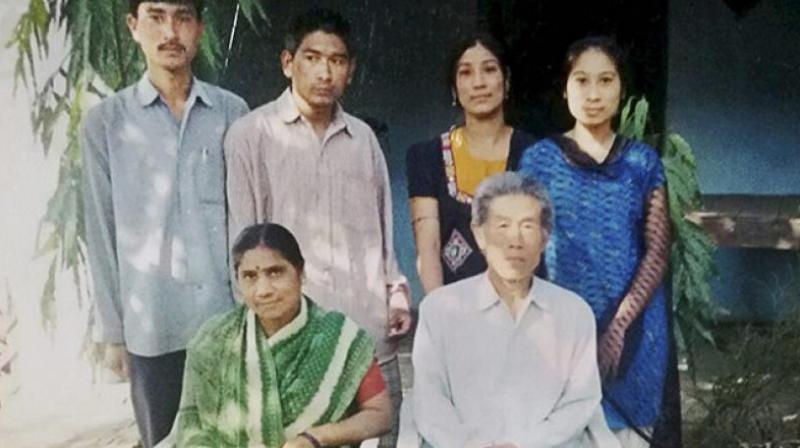Chinese soldier who crossed over border in 1963 returns home after 5 decades
Wang Qi, 77, was received by his close Chinese relatives, when he arrived along with his son, daughter-in-law and grand daughter.

Beijing: A Chinese soldier, who was stuck in India for over 50 years after he crossed over the border post 1962 war, today arrived in Beijing with his Indian family members to an emotional reunion with his Chinese kin.
Wang Qi, 77, was received by his close Chinese relatives, besides officials of the China's Ministry of Foreign Affairs and Indian embassy when he arrived here along with his son, daughter-in-law and grand daughter from Delhi-Beijing flight.
Wang became emotional as he hugged his relatives, their first reunion after he crossed into Indian side over five decades ago. "It was an emotional reunion," an official present at the airport said.
Wang was accompanied by his son Vishnu Wang, 35, daughter-in-law Neha and grand daughter, Khanak Wang. His Indian wife Shushila, however, stayed back.
Indian officials said Wang and family members will be later flown to Xian, the provincial capital in Shaanxi province from where he will be taken to his native village Xue Zhai Nan Cun in the province.
His return became a possibility after India and China worked out modalities for both Wang and his Indian family to travel together to China and later return as per their wish.
Wang was caught when he entered the Indian territory shortly after the Sino-India War of 1962. After his release from prison in 1969, he settled in Tirodi village of Balaghat district in Madhya Pradesh.
Though his story has been published by Indian media several times in the past, a recent BBC TV feature on him was widely picked by the Chinese social media highlighting his plight, prompting the Chinese government to initiate action in coordination with India to facilitate his return.
The Chinese Foreign Ministry said on February 6 that he was provided a passport to travel to China in 2013 and he was also paid a living allowance. Chinese Ambassador to India Luo Zhaohui recently spoke to him.
While the Chinese government has provided visas for his family to visit China, India has provided a re-entry visa for Wang to return back if he chooses to.
Indian officials terms the facilitation of the travel of Wang and his family by both sides s positive development, specially at a time when India-China relations were stuck with differences over issues like China-Pakistan Economic Corridor, China blocking India's entry into Nuclear Suppliers Group and listing of JeM leader Masood Azhar as terrorist by UN.
Before leaving for Beijing, Vishnu told media in India yesterday that "my father joined the Chinese Army in 1960 and he entered India through the eastern frontier after losing his way in the darkness one night."
He landed in Assam where an Indian Red Cross team handed him over to the Indian Army on January 1, 1963.
"My father spent six years in prisons in Assam, Ajmer, Delhi before the Punjab and Haryana High Court ordered his release in March 1969," Vishnu said.
"The Indian government had promised to the court that it will rehabilitate my father. He was taken to Delhi, Bhopal, Jabalpur and then finally handed over to Balaghat police," said his son.
Wang started working as a watchman with a mill and soon his colleagues named him Raj Bahadur, apparently due to his Nepali features, Vishnu said.
Wang's mother died in 2006 but he could not be with his dear ones in the time of grief, Vishnu said.
Three years later he met his nephew Yun Chun, who had come to India as a tourist and narrated his ordeal to him. After returning home, Chun got in touch with Chinese politicians and authorities to bring his uncle home. Finally, he met then Chinese Foreign Minister who helped Wang to get a Chinese passport in March 2013.

